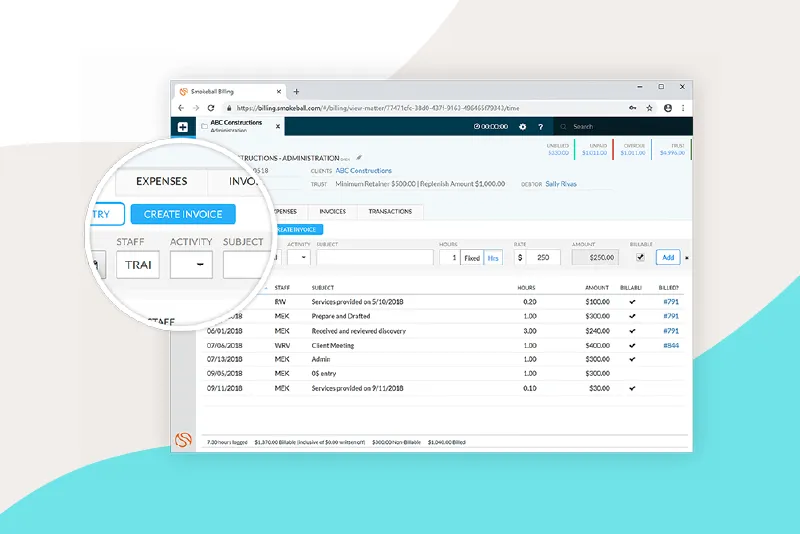Benchmarking Billable Hours: What Your Law Firm Can Learn from Industry Standards
Written by
|
December 19, 2024
Written by Smokeball
|
December 19, 2024

Written by Jordan Turk
|
December 19, 2024

As competition in the legal sector intensifies, the capacity to track and respond to important performance metrics is vital for maintaining operational efficiency — and ongoing profitability.
In today's competitive legal landscape, understanding how your firm measures up against industry standards is crucial. Law firms require more than just gut feelings to boost their profitability; they need insights based on data derived from their attorneys' legal cases to gain a clearer picture of success. As competition in the legal sector intensifies, the capacity to track and respond to important performance metrics is vital for maintaining operational efficiency — and ongoing profitability.
One area where many firms seek clarity is in billable hours. As we delve into the importance of establishing benchmarks for billable hours, we’ll analyze key metrics and averages, backed by recent industry statistics. We’ll highlight how leveraging legal reporting tools, such as Smokeball AI software streamlines monitoring critical metrics, identifying areas for improvement, and promoting long-term success for law firms.

The Significance of Billable Hours
Billable hours remain a fundamental metric for law firms, directly influencing revenue and profitability. While attorneys' billable hours are not directly compensated, their performance is closely tied to a law firm's profitability. Many firms set minimum annual targets for associates, with bonuses often linked to these metrics. Lawyers with lower hours may face layoffs as firms streamline their workforce.
Equity partners, who receive a base salary, often rely on achieving sufficient billable hours to secure a satisfactory salary. A significant portion of their earnings comes from their equity stake in the firm, which covers overhead and operational costs. If the firm fails to generate adequate billable hours, equity partners may experience a significant reduction in their earnings.
Establishing Benchmarking Standards
Benchmarking billable hours involves comparing your firm’s performance with industry averages and best practices. Here are some key metrics to consider:
- Average Billable Hours per Attorney: According to Clio’s 2024 Legal Trends Report, the average lawyer bills approximately 1,693 hours annually. However, firms aiming for higher profitability often set targets between 1,800 to 2,200 hours.
- Utilization Rates: This measures the percentage of time attorneys spend on billable work versus non-billable tasks. The Association of Legal Administrators (ALA) suggests that a utilization rate of 70% is often seen as the minimum for effective firms, with top firms exceeding 75%.
- Realization and Collection Rates: The realization rate — reflecting the percentage of billable hours invoiced — averages around 85% in the industry, while collection rates typically hover around 90%. Thomas Reuters notes that these metrics are crucial for assessing financial health and optimizing cash flow.
Analyzing Industry Averages
To effectively benchmark your billable hours, it’s essential to gather and analyze data from reputable sources. At Smokeball, we understand that industry averages not only provide context for your firm's performance but also helps pinpoint critical areas for improvement.
Here are a few averages from the legal industry:
- Billable Hours: As noted, the average attorney bills about 1,693 hours annually, with larger firms aiming for 2,000 or more, according to LEAP.
- Utilization Rate: A strong utilization rate generally falls between 65% and 75%. Anything below this threshold could indicate inefficiencies, as highlighted in the American Bar Association's toolkit for future-focused law firms.
- Realization Rate: The effective realization rate is typically between 85% and 95%, while a healthy collection rate hovers around 90% or higher, reflecting industry standards from the latest legal management reports.
Benchmarking your firm against industry averages for billable hours, utilization rates, and realization rates is crucial for optimizing performance. By comparing your firm’s metrics to these averages, you can identify gaps and create actionable plans to improve performance. These metrics provide a clear picture of your firm's standing and offer growth opportunities.
Consistently evaluating your strategies and how they are executed can boost efficiency and profitability, setting your firm up for success and exceeding industry benchmarks in an increasingly competitive legal environment.
The Role of AI-Powered Legal Billing Software
In the era of digital transformation, AI-powered legal billing software is becoming an essential tool for law firms aiming to enhance their billing practices. This cutting-edge technology simplifies the billing process by automating time tracking, invoicing, and expense management, which lets attorneys dedicate more time to their legal work instead of administrative duties.
With sophisticated analytics and reporting capabilities, AI-powered solutions offer important insights into billing trends and client profitability, helping firms make informed decisions based on data. Let’s take a closer look at how legal billing software, like Smokeball, can help:
- Automation of Time Tracking: AI can streamline the time-tracking process, automatically recording billable hours and reducing the risk of human error. This ensures that no time is lost and that every minute spent on client work is accounted for.
- Detailed Analytics: Advanced billing software provides detailed analytics and reporting features, allowing firms to track key metrics and benchmark their performance against industry standards. With these insights, firms can make informed decisions to optimize their billing practices.
- Improved Client Communication: AI tools can enhance transparency with clients by providing detailed invoices and breakdowns of billable hours, improving trust and satisfaction.
- Enhanced Workflow Efficiency: By automating repetitive tasks, legal professionals can focus on high-value work, leading to higher utilization rates and, ultimately, more billable hours.

Setting the Standard: Elevate Your Firm's Performance
Establishing benchmarks for billable hours is essential for law firms looking to thrive in a competitive market. By analyzing key metrics and industry averages, your firm can identify areas for improvement and drive greater efficiency. Coupling these efforts with Smokeball AI legal software can streamline your processes, enhance client satisfaction, and boost overall profitability.
Investing time and resources into understanding and improving your firm’s billable hours will not only set you apart from the competition but also ensure sustainable growth and success in the legal industry. As you evaluate your performance against these benchmarks, remember that continuous improvement is key to staying ahead in this dynamic environment.
Meet Archie: The Future of Legal Support
Smokeball AI simplifies law firm workflows by aiding in information gathering, letter drafting, and case summarization. Its AI Matter Assistant, Archie, offers real-time insights, enabling legal professionals to draft client communications, summarize cases, and use personalized intake forms. Learn more about Archie.

Why choose Smokeball?
Smokeball's legal AI tools, celebrated by G2 as the leading law practice management software, boost productivity and profitability for more than 15,000 clients around the globe, featuring Archie, the Smokeball AI Assistant.
Boost your productivity.
Book a demoLearn more about Smokeball document management for law firms:
Book Your Free Demo
Ready to see how Smokeball client intake software helps you Run Your Best Firm? Schedule your free demo!
















